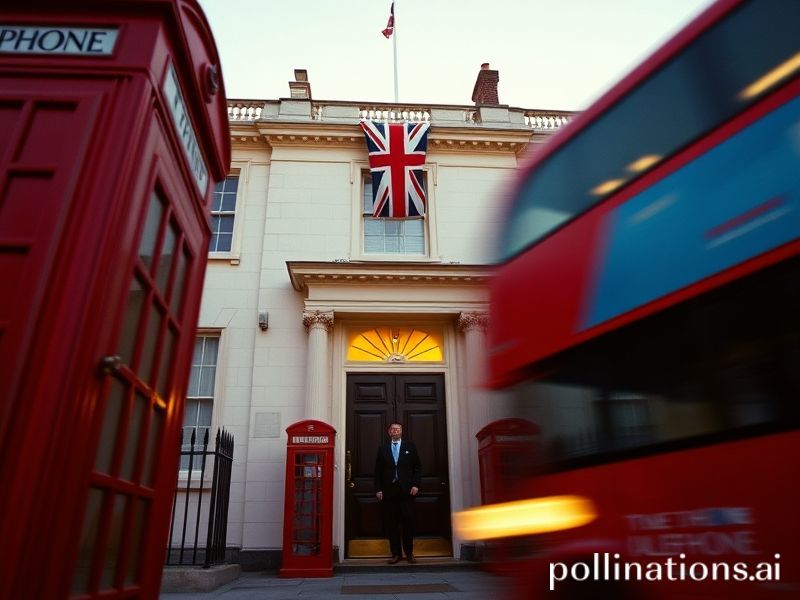Digital Empire 2.0: How Britain’s gov.uk Quietly Conquered the World with Drop-Down Menus
The Empire Strikes Back (With a 404 Error): How gov.uk Quietly Became the World’s Most Influential Government Website
——————————————————————————————————————
LONDON—While Washington spends its evenings rage-tweeting and Brussels labors to keep 27 toddlers from scribbling on the Treaty of Rome, a modest domain ending in “.uk” has been busy colonising the planet with ruthless efficiency. gov.uk—once just the digital filing cabinet of a soggy island that still debates whether salad cream is a food group—now serves as the stealth operating system for half the governments on Earth, proving that soft power these days travels at broadband speed and never needs a visa.
The numbers are almost insulting. Over 40 national portals, from the fjords of Norway to the beaches of Ghana, run on GOV.UK’s open-source template, affectionately nicknamed “Whitehall-in-a-Box.” That means when a farmer in rural Rwanda clicks “Apply for pesticide licence,” the drop-down menus flirt with Her Majesty’s typography and the polite British voice that once asked you to mind the gap is now telling you to upload a PDF under 2 MB. Imperialism by font choice: the final frontier.
Irony, of course, adores symmetry. The very country that voted to “take back control” now exports administrative competence like it once did smallpox blankets. Brexit Britain can’t quite decide what to do with Northern Ireland, but it has absolutely nailed the user-journey funnel for renewing a fishing permit. Dominic Cummings may have wanted a “Singapore-on-Thames”; what he got instead is a Singaporean ministerial dashboard cloned from a council-tax portal in Wolverhampton.
The global appeal is easy to diagnose. gov.uk treats citizens the way Amazon treats Prime subscribers: as impatient mammals who will abandon their shopping carts at the first captcha. Strip away the heraldic crests and you have a ruthless conversion-rate machine—one that manages to be both courteous and utterly merciless. A single typo in your National Insurance number will bounce you back faster than a drunk expat at immigration, yet the error message is so apologetic you find yourself thanking the algorithm for the rejection.
Emerging economies adore this rigor. When your last census was conducted by a man on a moped waving a clipboard, the idea that a website can issue a birth certificate in four minutes feels positively Arthurian. Meanwhile, established democracies watch with the queasy admiration of a mafia don discovering that the new restaurant on the corner is laundering money more efficiently than his own casino. France tried to build MonServicePublic.fr; it now redirects half its traffic to Stack Overflow. Germany’s Bundesportal still requires thirteen separate logins, one of which is literally a fax.
Even the Americans—who invented the internet, the browser, and the pop-up ad apologising for the other pop-up ad—have started borrowing the Brits’ homework. The U.S. Digital Service quietly forked the gov.uk codebase last year, proving that when Washington wants competence it outsources to the very country it once fought for the right to ignore. Somewhere in a windowless office in GDS (Government Digital Service), a civil servant named Gemma is deciding the colour palette for Guam.
Of course, no empire is complete without unintended consequences. As nations copy-paste Whitehall’s design patterns, they also import its assumptions: a cheerful tolerance for queueing, a suspicion of emojis, and an absolute faith that somewhere, a form exists for everything. In Manila, citizens now mutter “computer says no” in Tagalog. The Finnish tax authority recently apologised for a “brief technical hiccup” that lasted exactly 37 seconds—an apology that was, naturally, modelled on the GOV.UK incident template.
And so the sun never sets on the digital civil service. The Union Jack may be lowered in former colonies, but its dropdown menus continue their patient march across the globe, asking in the same calm sans-serif whether you’d like to continue in Welsh. Should you decline, the site will remember your choice forever—an act of bureaucratic memory more durable than any bronze statue toppled in last summer’s protests.
In the end, gov.uk teaches us that influence today is less about aircraft carriers and more about cookie banners you actually read. The British Empire redux will not arrive with gunboats, but with a polite reminder that your passport photo has too much shadow on the left cheek. Resistance is futile; the chatbot is terribly sorry, but it simply cannot process your rebellion unless you complete form REV-16C.







